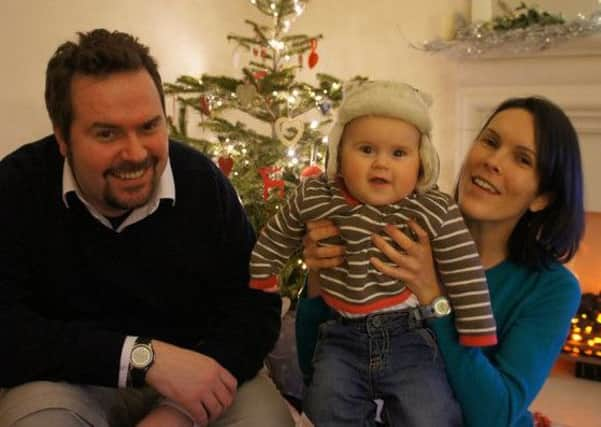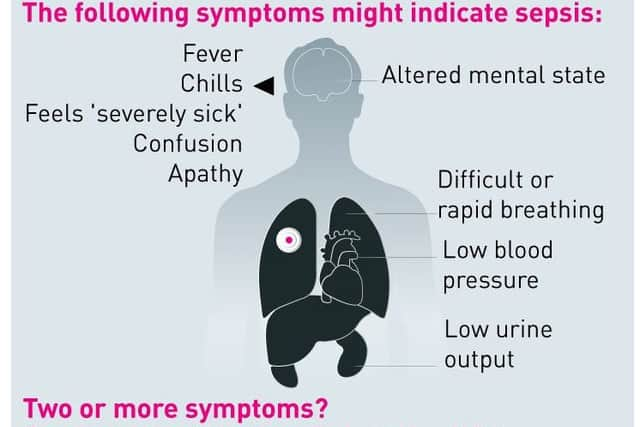Sepsis awareness fight taken to Scottish Parliament


In the space of 62 hours, Craig Stobo lost his unborn baby daughter, his wife and almost his own life to sepsis.
He has spent the five years since trying to raise better awareness – both with the public and medical professionals – through the charity he set up in his wife’s memory, the Fiona Elizabeth Agnew Trust (FEAT).
Advertisement
Advertisement
The Scottish Government earlier this month rejected calls for a national campaign to raise awareness.


But all hope is not yet lost – for Craig is meeting with health minister Shona Robison on Wednesday, September 27, in hopes of securing a better outcome.
He said: “We want the Scottish Government to do the right thing and work with us to raise awareness.
“We need a thorough national campaign as quickly as possible to help start saving more lives – and I’m hopeful that will happen.”
Advertisement
Advertisement
If anyone can convince the Scottish Government to change its mind, 47-year-old Craig has the best shot.


Because he knows first hand just how devastating a toll sepsis can take.
In August 2012, Craig, his wife Fiona – who was at that time a GP in Bo’ness – and their two-year-old son Robert were looking forward to a new family arrival.
Having just moved into a new home in Edinburgh, the future was looking good.
Advertisement
Advertisement
However, unbeknown to the family, the flat’s previous owner had a dog with a flea infestation – and Craig and Fiona were subsequently bitten.


And something as simple as a flea bite left both their lives and their unborn child’s hanging in the balance.
Craig said: “Luckily for me, Fiona recognised the symptoms and got me to Edinburgh’s Western Hospital quickly, where I was diagnosed and started treatment straight away.
“That was on Thursday, August 23, 2012.
“The following day, Fiona – who was 35 weeks pregnant at the time – was taken ill.


Advertisement
Advertisement
“She was again diagnosed and treated very quickly at Forth Valley Royal Hospital.
“One of the midwives called me late that Friday night to tell me our daughter Isla had died in the womb.
“My doctors initially said I was too unwell to travel but Fiona’s condition was so grave I was allowed to go through a few hours later.
“The doctors battled all day Saturday to save Fiona’s life but sadly they were unsuccessful. Fiona died at 1.50am on the Sunday from multiple organ failure caused by sepsis.
Advertisement
Advertisement
“The condition is so indiscriminate and comes on so rapidly – I was in severe shock for a while.
“In 62 hours, I lost my daughter and my wife and almost my own life to the condition – it’s brutal.”
People would surely have forgiven Craig for curling up into a ball and switching off.
But the now single dad was determined to find out more about the illness which claimed his two girls.
Advertisement
Advertisement
He said: “I had a lot of questions so I started doing a bit of research and was horrified by what I found.
“It was a bit like cancer was back in the 1970s – it was not as well understood as it needed to be.”
So on May 1 2013, Craig launched the Fiona Elizabeth Agnew Trust (FEAT) in a bid to change that picture.
The charity’s original Stop Sepsis Now campaign helped raise awareness of the condition.
Advertisement
Advertisement
Now, every September, the charity runs its Sock it to Sepsis campaign which encourages people to wear red and white socks to help raise awareness and funds to research better treatment.
World Sepsis Day, which is held every September, helps spread the word too.
While FEAT has witnessed improvements in both public and medical recognition of sepsis, more work still needs to be done.
Craig explained: “It’s estimated that 44,000 people in the UK die each year from the condition – around 3500 in Scotland – and that’s only an estimation.
Advertisement
Advertisement
“Again, it is estimated we could cut the number of deaths each year by between 8000 and 14,000 if people were diagnosed and treated more quickly.
“But that still leaves around 30,000 people for whom the current treatment simply doesn’t work.
“So while awareness is priority number one for FEAT, we also need to raise funds to research additional treatments that will work for everyone. The real key is getting diagnosed as quickly as possible though.
“Having been through it myself, the speed of onset is bewildering and shocking.
Advertisement
Advertisement
“You go from feeling good to profoundly unwell in a few hours. It’s pretty horrifying when you’re in the midst of it how quickly it escalates.
“And that’s why we need a national public awareness campaign.
“People – both the public and medical professionals – need to know the symptoms and act quickly.
“We need sepsis to be treated in much the same way as heart attacks and strokes now are.
Advertisement
Advertisement
“To get treatment in the first hour of diagnosis is essential for better outcomes.”
It’s too late for Fiona and Isla, but Craig is hopeful a national awareness campaign will be approved – and help to save countless lives in the future.
National awareness campaign is “not necessary” at this time
The Scottish Parliament’s public petitions committee said a national awareness campaign was “appropriate”.
Sadly, earlier this month, the government responded – saying it did not consider a campaign “necessary at this time”.
Advertisement
Advertisement
Health minister Shona Robison said: “Sepsis is a huge challenge for the NHS but huge progress has been made through the patient safety programme, with a reduction in sepsis mortality of 21 per cent since 2012.
“There is a lot of work going on to ensure the ‘golden hour’ of treatment is taken.”
Craig Stobo is still hopeful the Scottish Government will “do the right thing” following a meeting on September 27.
Sepsis arises when the body’s response to an infection injures its own tissues and organs.
Advertisement
Advertisement
If you have two or more of the following symptoms, seek immediate medical attention: very high or low temperature, difficulty breathing, rapid heart beat, low blood pressure, slurred speech, confusion, drowsiness or loss of consciousness, uncontrollable shivering, changes in skin colour such as very cold or very flushed hands and feet, a reduction in urine passed and a recent or current infection.
If sepsis is treated aggressively within the first hour – the golden hour – the risk of death is halved and survival rates can be more than 80 per cent.